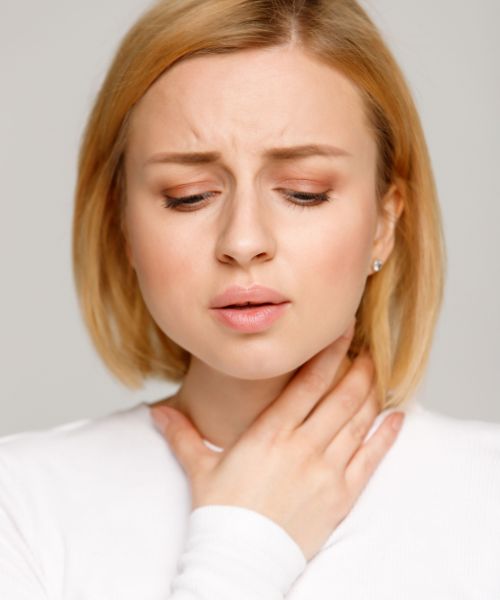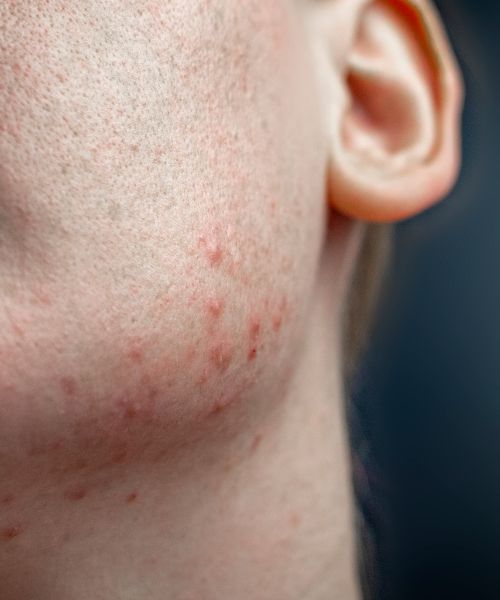Acne is an inflammatory condition that, although appearing simple and straightforward as something caused by an overgrowth of bacteria, is actually a complex disorder that can be caused by many underlying factors.
One such factor is an overactive thyroid, known as hyperthyroidism.
Hyperthyroidism occurs when the thyroid gland produces too much of certain hormones, leading to an imbalance that can have various effects on the body, both physical and psychological.
Therefore, in this article, we’ll explore the connection between hyperthyroidism and acne, including what causes it, symptoms, treatments, and more.

What is Hyperthyroidism?
Located at the base of the neck, the thyroid is a small butterfly-shaped gland responsible for secreting the hormones that control the body’s growth, development, and metabolism, which are essential to the functioning of almost all organs and processes.
When the thyroid becomes overactive, it produces too much of these hormones, a condition known as hyperthyroidism that can cause various unpleasant symptoms and physical changes.
The Symptoms of Hyperthyroidism
Some symptoms of hyperthyroidism include heart palpitations, anxiety, breathing difficulties, sweating and trembling, fatigue, muscle weakness, and insomnia.
Additionally, some physical changes that may occur include weight loss, bulging eyes, redness in the face, swollen neck (goiter), and skin changes like thinning, dryness, and inflammatory conditions.
The Causes of Hyperthyroidism

From everyday things to rare conditions, there is a wide range of potential causes for hyperthyroidism.
Here are some of the most common ones:
Birth Control
Birth control is one of the most common everyday things that can cause hyperthyroidism.
This usually occurs when the body becomes overly sensitive to synthetic hormones, resulting in an overproduction of thyroid hormones.
Additionally, birth control depletes essential vitamins and minerals in our body, including selenium, which is necessary for proper thyroid functioning.
In fact, if you suspect you have thyroid issues, consulting with your doctor about stopping the pill and supplementing with selenium is a good idea.
Overactive Thyroid Nodules
An overactive thyroid nodule is an overgrowth of cells inside the thyroid gland that causes it to produce too much thyroid hormone.
A number of factors, such as inflammation, genetic predisposition, radiation exposure, or an autoimmune disorder can cause this.
Thyroiditis
Thyroiditis is an inflammation of the thyroid that often occurs due to autoimmune disorders. It can cause hyperthyroidism, as well as hypothyroidism depending on the severity of the inflammation.
Iodine Link
Iodine, a nutrient found in many foods, is necessary for proper thyroid functioning. However, too much iodine can cause hyperthyroidism.
Therefore, if you are dealing with this condition, avoiding foods such as seaweed, seafood, and iodized salt is recommended.
Stress
A perpetual state of stress can also affect the functioning of the thyroid and, in some cases, cause hyperthyroidism.
Stress elevates cortisol levels and suppresses the immune system, which can lead to inflammation in the thyroid and disrupt its functioning.
Graves’ Disease
Graves’ disease is the most common cause of hyperthyroidism and is an autoimmune disorder in which the body’s immune system attacks its own tissues.
However, even though this condition is responsible for 60% to 80% of hyperthyroidism cases, it’s a relatively rare occurrence that affects only 2-3% of the general population.
Can Hyperthyroidism Cause Acne?
One symptom of hyperthyroidism can be inflammatory skin conditions such as acne.
This happens because the hormones released by the overactive thyroid can cause inflammation in the skin, which can lead to an increase in oil production, clogged pores, and breakouts.
It is important to note that acne due to hyperthyroidism may be slightly different than other types of acne and may need different treatment as well as medication and lifestyle changes to manage the overactive thyroid and improve the issue from within.
What Does Hyperthyroidism Acne Look Like?

Due to its proximity to the thyroid gland, hyperthyroidism acne may appear along the jawline and neck and can look big, discolored, purplish, and cystic.
This type of acne is usually hard to the touch and can be rather painful. The spots also look like blind pimples and don’t have a white or pustular tip. These pimples are also impossible to squeeze, and any attempt to do so is not recommended as it can be a very painful experience and can cause the spot to enlarge and leave a scar.
Additionally, some people with hyperthyroidism can develop a rare skin rash called pretibial myxedema (thyroid dermopathy). The rash is characterized by red, swollen skin and commonly appears on the shins and tops of feet.
While not characterized as acne, it is important to note that this rash can be an indicator of hyperthyroidism and should not be ignored.
How to Treat Hyperthyroidism Acne?
When dealing with hyperthyroidism acne, the first step is to get your thyroid levels under control. Depending on the severity of the condition, this can be done with medications, lifestyle changes, and/or supplements.
Here are some helpful tips to reduce and manage your hyperthyroidism acne:
Food & Drinks
Food and drinks can be common triggers for hyperthyroidism and acne flare-ups. Therefore, avoiding inflammatory foods like processed, sugary, and dairy foods can help reduce breakouts.
Additionally, limiting your caffeine and alcohol intake can help reduce thyroid inflammation, thus improving overall skin health.
These are just a few things I did when my cystic acne was at its worst, and although I was never diagnosed with hyperthyroidism, I pretty much had all the symptoms of this condition, including painful cystic acne on my jaw; I just never bothered to get it checked out.
In a previous article, I listed the few smart swaps and tips that helped me clear a good chunk of my cystic acne in only five days during the time I suspected my thyroid was to blame, so I hope this information will help you too.
Healthy Weight Gain
Hyperthyroidism can make you lose weight rapidly, which can be detrimental to your health and even affect your skin’s appearance by making your skin look dull and dry and exacerbating breakouts.
To gain weight in a healthy manner, focus on consuming healthy, nourishing whole foods and avoiding processed foods as much as possible.
Furthermore, instead of eating big meals once or twice a day, try to eat smaller meals more frequently throughout the day, as this will help your body better absorb all the nutrients it needs.
In addition to eating healthy, aim to exercise regularly, particularly focusing on lifting weights, which can help you build muscle and gain weight in a healthy way.
Supplements
If you can’t get certain nutrients from your diet or want to optimize your health while dealing with hyperthyroidism, certain supplements may help reduce the symptoms of your condition.
Here are the best supplements to consider taking for hyperthyroidism acne:
- Selenium – regulates hormones and boosts the immune system.
- Vitamin A – regulates thyroid hormone production.
- Zinc – protects the thyroid gland from oxidative damage.
- Vitamin C – regulates thyroid hormones by converting inactive Thyroxine into active Triiodothyronine.
- L-carnitine – stimulates the metabolism and promotes healthy weight gain.
- Bugleweed – reduces symptoms of hyperthyroidism such as anxiety, restlessness, and fatigue.
- B vitamins – reduce stress levels and increase energy.
Topical Products
Finally, we’ve come to the external part of the treatment plan for hyperthyroidism acne.
And while topical products won’t have an effect on what’s inside the body and won’t help regulate certain irregularities like overactive thyroid and hormonal imbalances, having a good skincare routine sure does help soothe and heal the skin, as well as reduce inflammation and breakouts.
Therefore, regardless of whether your acne is caused by hyperthyroidism or any other underlying condition, here are a few essential skincare products you should incorporate into your routine if you’re dealing with this inflammatory condition:
Gentle cleanser – to remove dirt, oil, makeup, and other impurities from your skin and prevent clogging.
Retinoid – a gentler alternative to exfoliation, retinoids will help unclog pores and reduce inflammation while strengthening the skin barrier over time and making it more resistant to pathogens.
Moisturizer – to restore hydration and prevent the skin from drying out and pumping more pore-clogging oil to compensate for the dryness.
Sunscreen – to protect the skin from UV damage and prevent pigmentary disorders and scarring left from acne.

My name is Simone and I am a certified skin specialist. I created this website to teach my readers how to take great care of their skin and I also like to occasionally share my honest opinions on skincare products I’ve tried. You can learn more about me here.
